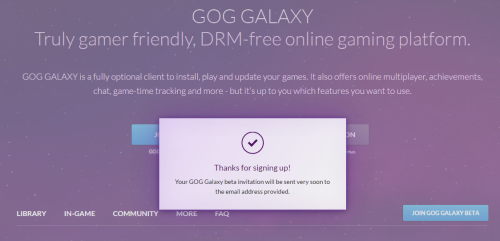Why I think GOG Galaxy is a Good Thing
By EricMesa
- 7 minutes read - 1373 wordsIf I mentioned it on this site, I wasn’t able to find it in a search because of the generic word, but I was very annoyed and pretty upset about EA’s Origin store and platform. Part of what I enjoy so much about playing PC games is that the only limitations on what you can run are based on OS and the power of your hardware. In the console world there are games exclusive to Playstation or Xbox and for the non-exclusive games I have to figure out (if I’m planning to game socially) which platform my friends and family are going to buy the game on. For PC games that’s not an issue. All games run on Windows and a greater and greater number run on Linux and OSX. Usually, no matter the OS, everyone can play together online.
The part of PC gaming that made me upset about EA’s Origin was the limiting of all (or most of the big ones) their games to that platform. Before that you could choose Amazon, Steam, or any other way to get the games digitally. It’s OK for Origin to exist, but simply because I HAD to use it for EA rather than it being a choice (like maybe if they had some better sales than Steam), I’ve essentially boycotted it. It’s the reason I still haven’t played Mass Effect 3. Its mandated use also means someone else needs to have my credit card info, another folder with games, another place to check for deals, etc. It just makes things more complex than they need to be. Also, then Ubisoft and others started making noises of further fragmentation. Ugh! Don’t increase the friction for me to spend money on your games!
But I think that GOG’s new Steam-alike (I’m sure others have independently coined that - feel free to spread it around) is a good thing. Why?
Because, unlike EA’s Origin, GOG Galaxy is not publisher specific. Additionally, GOG is providing a competitive difference over Steam in a few different ways. It is the marketplace working as intended! (Rather than being used to keep incumbents in power) Also, it was badly needed as it was keeping me from spending more money there.
So, first, what is GOG providing to differentiate itself from Steam? Perhaps because it began life as Good Old Games, using Dosbox and other means to get old games to run on modern computers (and getting licenses from the creators to do so), they have a strong commitment to providing DRM-free games. This is something I value and something that more and more people are valuing as word of its annoyances spread beyond those of us in the techie/EFF/free software world. I’ve been burned a few times before by DRM, so given the choice between the same game with DRM and without, I’ll choose without, thank you. In fact, recently I’ve actually chosen to buy a game on GOG rather than Steam just for this fact. Additionally, many publishers implement this via needing a constant Internet connection. While I’m blessed to live in a place where I can actually choose between FiOS and Comcast (Sure, both are evil, but I have a choice), Ars recently did a story on how even in the suburbs of some pretty major cities, it can be hard to get broadband. Also, sometimes the Internet goes out. That’s when you most need to be able to read or play games that don’t need an Internet connection. Additionally, nearly every GOG game comes with lots of fun freebies: manuals, desktop backgrounds, soundtracks, user icons, and more. Some of this is more valuable than others, but it’s still a nice perk.
As you can see, I think it’s pretty important. Also, it helps to send a message to the publishers. After a few years of Humble Bundle, I think publishers have seen (and quite a few of the indies have been vocal in publishing) that their illicit download rates (misnamed piracy) have been somewhere between unchanged and lower without DRM. So they get to not have to pay to license that and the consumer gets a better experience. In fact, I think if GOG gets their act together perhaps instead of Steam keys (or in lieu of Steam keys), Humble will be providing GOG keys to their games. I think it’d work quite well. I always find it weird to be buying DRM-free games on Humble, but because I like everything managed from the same place, I end up getting what is likely a DRM-filled version from Steam when I redeem my Steam keys.
Now onto why I think GOG needs or, as you’ll see from their PR material, could benefit from Galaxy, their Steam-alike. When I first got involved with GOG (I think they were having a giveaway or super cheap version of Fallout or Dungeon Keeper), here’s the only interface I had for the games:
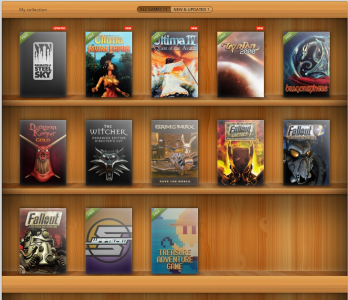
There’s something kind of pretty for it. For one thing it reminds me of box art which, as in music, is becoming a lost art. For another, it reminds me shelves as a way to showcase one’s interests. But when it comes to downloading the game (and extra goodies) - it’s somewhat clunky. So GOG introduced their downloader:
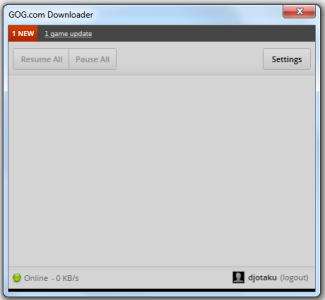
It was a step up in a few ways. It allowed me to easily download the game an all its goodies at once. It resumed interrupted downloads. It let me know there were updates, but didn’t make actual updating any easier. I was never sure I’d actually updated whatever I was supposed to update. This, more than anything, made me hesitate a bit on whether to buy a game on GOG or Steam - especially when it was newer and I thought it might have lots of patching to do. So it seemed that Galaxy was the next logical step.
However, GOG gets some advantages based on both their philosophy (best demonstrated by their anti-DRM stance) and on being late to the party. They’re able to design a platform that does Steam better than Steam does Steam.
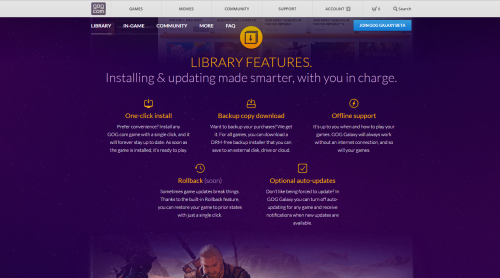
This is best demonstrated by 1) their insistence that the games will work without Internet and EVEN BETTER 2) every aspect of GOG Galaxy (including whether or not to use it is optional). So if you like auto-updates you can turn it on. If not, don’t worry. If you like chatting, turn it on….and so forth.
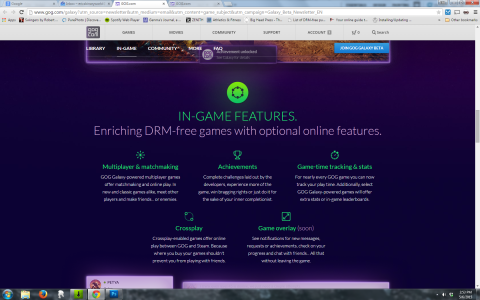
Again, lots of optional features, many of them great! For example, I don’t use achievements to determine how I stack up to others because it can too easily be gamed. But I *do* like achievements to help encourage me to try new features or to reward me for exceptional gameplay. (I’ve blogged about that before, but don’t have time to look up now) Crossplay gets to what I was talking about in the beginning of this blog post - PC gaming should continue to be unified! It’s one of its greatest strengths against console gaming. Time tracking is slightly less important because of my use of Raptr, but it’s a nice feature.
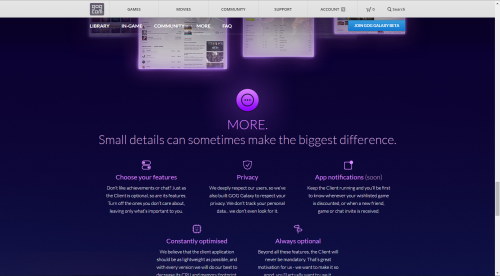
These are great things to promise. I hope that GOG can continue to stand on principles even as it adds more Triple A games. (Humble Bundle continues to be a great source of entertainment for me, but it has long since abandoned its DRM-free stance and Linux/OSX stance. However, I do admire that they do call out which games ARE DRM-free) It is the difference that makes GOG worth a look. Otherwise, they’re just a Steam wannabe. But if they can stick to their principles, they can help change the gaming world like Amazon did with MP3s. (Yeah, people like to put that at St Steve Jobs’ feet, but he only did that in reaction to losing his grip to Amazon)
Finally, I forgot to mention it above, but one thing where Steam excels is in facilitating Linux installs. Games just work whether you have Ubuntu (and derivaties) or Fedora (and derivaties). Hopefully GOG Galaxy in its final form can provide this ease of use because a good chunk of their newer games also work on Linux.
I’ll have another blog post when I get into the Beta program.
